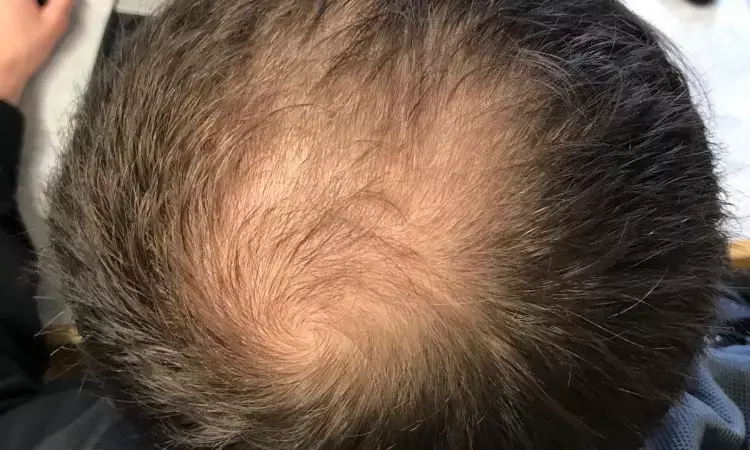- Home
- Medical news & Guidelines
- Anesthesiology
- Cardiology and CTVS
- Critical Care
- Dentistry
- Dermatology
- Diabetes and Endocrinology
- ENT
- Gastroenterology
- Medicine
- Nephrology
- Neurology
- Obstretics-Gynaecology
- Oncology
- Ophthalmology
- Orthopaedics
- Pediatrics-Neonatology
- Psychiatry
- Pulmonology
- Radiology
- Surgery
- Urology
- Laboratory Medicine
- Diet
- Nursing
- Paramedical
- Physiotherapy
- Health news
- Fact Check
- Bone Health Fact Check
- Brain Health Fact Check
- Cancer Related Fact Check
- Child Care Fact Check
- Dental and oral health fact check
- Diabetes and metabolic health fact check
- Diet and Nutrition Fact Check
- Eye and ENT Care Fact Check
- Fitness fact check
- Gut health fact check
- Heart health fact check
- Kidney health fact check
- Medical education fact check
- Men's health fact check
- Respiratory fact check
- Skin and hair care fact check
- Vaccine and Immunization fact check
- Women's health fact check
- AYUSH
- State News
- Andaman and Nicobar Islands
- Andhra Pradesh
- Arunachal Pradesh
- Assam
- Bihar
- Chandigarh
- Chattisgarh
- Dadra and Nagar Haveli
- Daman and Diu
- Delhi
- Goa
- Gujarat
- Haryana
- Himachal Pradesh
- Jammu & Kashmir
- Jharkhand
- Karnataka
- Kerala
- Ladakh
- Lakshadweep
- Madhya Pradesh
- Maharashtra
- Manipur
- Meghalaya
- Mizoram
- Nagaland
- Odisha
- Puducherry
- Punjab
- Rajasthan
- Sikkim
- Tamil Nadu
- Telangana
- Tripura
- Uttar Pradesh
- Uttrakhand
- West Bengal
- Medical Education
- Industry
Androgenic alopecia linked to increased risk of metabolic syndrome: Study

P.R. China: Androgenic alopecia (AGA) patients are at an increased risk of developing metabolic syndrome, and appropriate screening and counseling may be warranted, according to a meta-analysis in the journal Acta Dermato-Venereologica.
Several studies have investigated the association of androgenetic alopecia with metabolic syndrome but have yielded conflicting results. Yaping LiSecond Xiangya Hospital, Central South University, Hunan, P.R. China, and colleagues, therefore, conducted a meta-analysis to quantitatively evaluate the risk grade of metabolic syndrome and the metabolic profile in patients with androgenetic alopecia compared with controls. A total of 19 articles consisting of 2,531 participants met the inclusion criteria.
It is important for physicians to screen metabolism-related indicators in patients with androgenetic alopecia. More rigorously designed studies and larger sample sizes are required in future studies.
Key findings of the study include:
- The pooled odds ratio for the prevalence rate of metabolic syndrome between the group with androgenetic alopecia and controls was 3.46.
- Female sex, early-onset, and African ethnicity were associated with an increased risk of metabolic syndrome.
- Patients with androgenetic alopecia had significantly poorer metabolic profiles, such as body mass index, waist circumference, fasting glucose, blood lipids, and blood pressure.
"The dermatologists should educate patients that the data in literature associating AGA and MetS are trending positively," the authors wrote. "The need for a complex workup should be addressed on a case-to-case basis as there are no society guidelines."
"The assessment of the patient's clinical picture should be done including already existing metabolic data such as insulin resistance, weight, lipid, and blood pressure levels, they explained. " Dermatologists should work with primary care colleagues to ensure that proper screening measures are completed and that each patient's unique metabolic circumstances are addressed."
To sum up, it is important for physicians to screen metabolism-related indicators in androgenetic alopecia patients. More rigorously designed studies and larger sample sizes are needed in future studies.
Reference:
Qiu, Y., Zhou, X., Fu, S., Luo, S., & Li, Y. (2022). Systematic Review and Meta-analysis of the Association Between Metabolic Syndrome and Androgenetic Alopecia. Acta Dermato-Venereologica, 102, adv00645. https://doi.org/10.2340/actadv.v101.1012
Dr Kamal Kant Kohli-MBBS, DTCD- a chest specialist with more than 30 years of practice and a flair for writing clinical articles, Dr Kamal Kant Kohli joined Medical Dialogues as a Chief Editor of Medical News. Besides writing articles, as an editor, he proofreads and verifies all the medical content published on Medical Dialogues including those coming from journals, studies,medical conferences,guidelines etc. Email: drkohli@medicaldialogues.in. Contact no. 011-43720751


